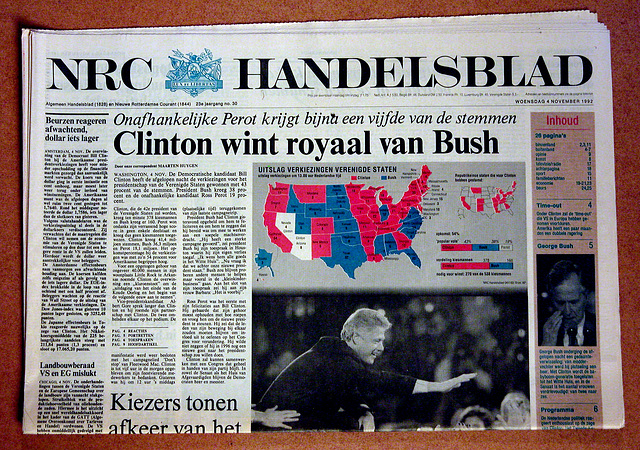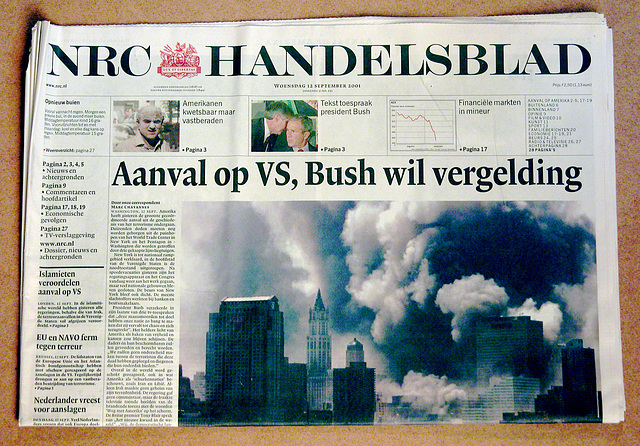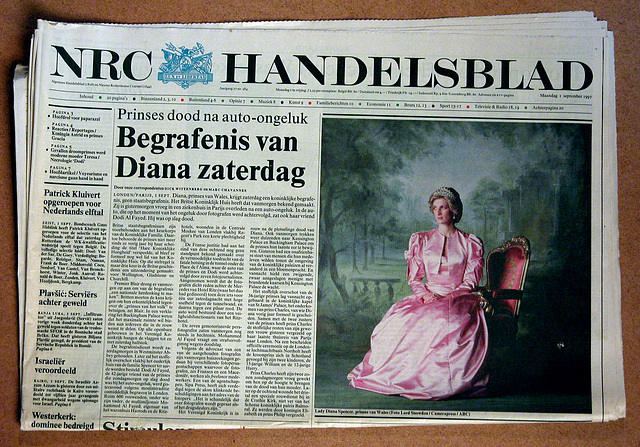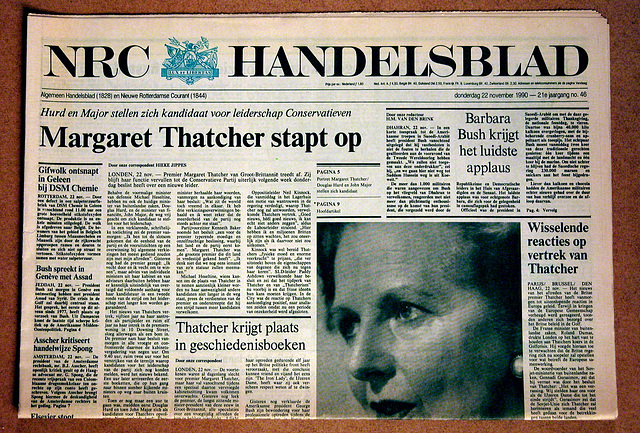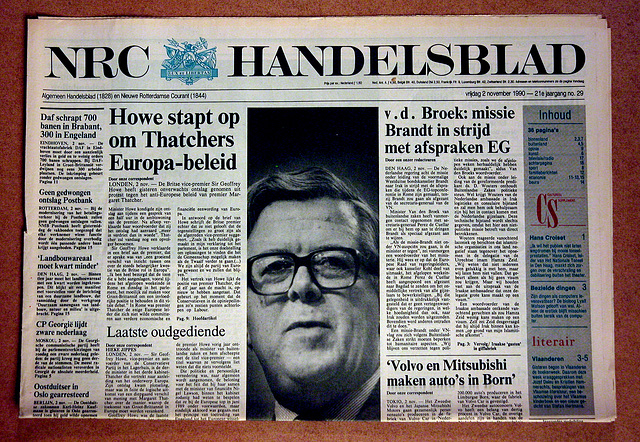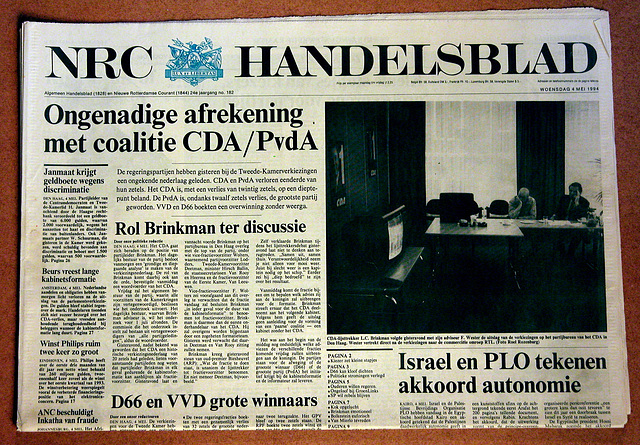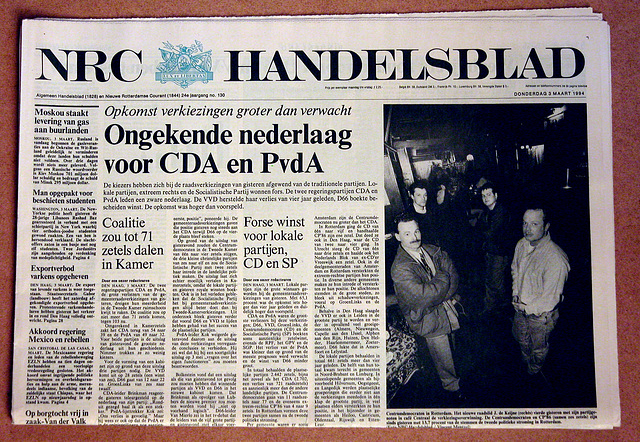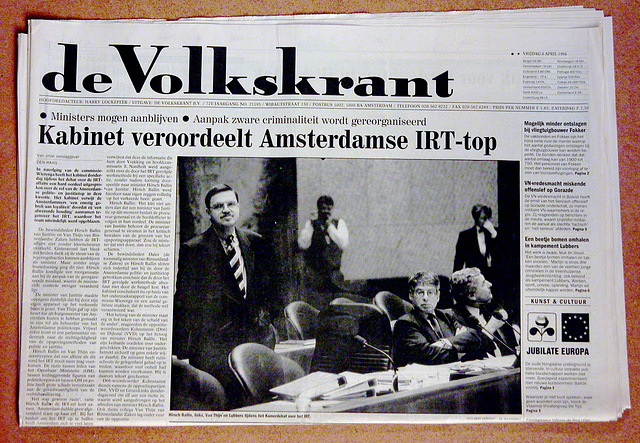
Old newspapers
Front pages of old newspapers
26 Sep 2007
Recent history in newspapers: September 1, 1997: Princess Diana dies
Princesses or queens dying in car crashes isn't that unusual: In 1935 Queen Astrid of Belgium died in Küssnacht (Switzerland) and in 1982 Grace, Princess of Monaco died in Monaco. All these deaths caused a lot of emotions.
26 Sep 2007
Old newspapers: November 22, 1990 – Margaret Thatcher resigns
I could not remember there being a different Prime Minister other then mrs. Thatcher, because she became the PM when I was nine. In the end it had all turned a bit sour, she thought she was the Supreme Ruler of the Universe and she had few friends. Geoffrey Howe wielded the knife, Michael Heseltine moved in for the kill, but John Major succesfully climbed the greasy pole. Ah.. the Major years, where every week another minister was found wearing women's clothing or was discovered to be spending time with total strangers in the harbour.
26 Sep 2007
Old newspapers: November 2, 1990 – Geoffrey Howe resigns
Geoffrey Howe fought with Margaret Thatcher over Europe. Howe wanted a closer union, integrating the Pound Sterling into the Exchange Rate Mechanism, while Thatcher remained largely opposed and suspicious of Europe. In the end Howe resigned and he made an absolute marvellous resignation speech in the Commons, probably the only speech worth remembering of this politician who was known as "Mogadon Man". The Labour politician Dennis Healey once described debating with Howe " like being savaged by a dead sheep ". Hansard has the complete speech .
I remember seeing the resignation speech live on the BBC and I was flabbergasted for the second time. The first time was when I saw the Commons for the first time. It was Sir Ian Gow, a Conservative MP, later murdered by the IRA, who held the traditional backbencher's speech after the Queen's Speech.
Thatcher was right about Europe though.
26 Sep 2007
Recent history in newspaper: May 2, 1997 Tony Blair becomes PM after a Labour landslide
I didn't have a television at that time, so I didn't see Michael Portillo losing his seat. I listened to the radio, and I remember one commentator saying: "This is the biggest loss for the Tories since...since...since...the Duke of Wellington". I'm not a great fan of socialists, but it was a breath of fresh air after the scandal-ridden Tories. And I always liked Tony Blair's eloquence.
Soon after Labour came to power the BBC made a documentary about Robin Cook, who became Foreign Secretary. He removed a portrait of an Indian prince from the Foreign Office building because it was "to politically incorrect". No sense of history these socialists.
26 Sep 2007
The birth of the Purple Government in 1994
Dutch politics could be explained to foreigners by saying that there was a socialist party, who wanted to increase the top rate of tax to 80% of income; a liberal party who wanted to lower the taxes to 78% of income and a party who were against the French Revolution.
Things have changed a bit: the party who were against the French Revolution merged with the catholic party to become christian democrats. In the early 1990s the liberals and the socialists formed a government together, because they were fed up with the christian democrats. The christian democrats (or the seperate christian parties) positioned themselves in the middle of Dutch politics and were part of every government since times immemorial, choosing between the liberals and the socialists depending on their mood and the election result.
The liberals and the socialists are on the opposite sides of the Dutch political spectrum (at least in the 1990s) so it was quite a strange coalition. In order to make this coalition possible, some things had to happen. More in particular, a leadership crises (the old one, mr. Ruud Lubbers of UN fame, didn't like the new one, mr. Elco Brinkman. In the end, the Dutch didn't like Brinkman too) in the christian democratic party and several general scandals.
This newspaper is about the election results of the national elections. Enormous defeat for the christian democrats and socialist government.
26 Sep 2007
The birth of the Purple Government in 1994
Dutch politics could be explained to foreigners by saying that there was a socialist party, who wanted to increase the top rate of tax to 80% of income; a liberal party who wanted to lower the taxes to 78% of income and a party who were against the French Revolution.
Things have changed a bit: the party who were against the French Revolution merged with the catholic party to become christian democrats. In the early 1990s the liberals and the socialists formed a government together, because they were fed up with the christian democrats. The christian democrats (or the seperate christian parties) positioned themselves in the middle of Dutch politics and were part of every government since times immemorial, choosing between the liberals and the socialists depending on their mood and the election result.
The liberals and the socialists are on the opposite sides of the Dutch political spectrum (at least in the 1990s) so it was quite a strange coalition. In order to make this coalition possible, some things had to happen. More in particular, a leadership crises (the old one, mr. Ruud Lubbers of UN fame, didn't like the new one, mr. Elco Brinkman. In the end, the Dutch didn't like Brinkman too) in the christian democratic party and several general scandals.
This is the newspaper about the result of the local elections, just prior to the national elections. That gave enough indication that it the people didn't like the christian democrats and the socialists.
26 Sep 2007
The birth of the Purple Government in 1994
Dutch politics could be explained to foreigners by saying that there was a socialist party, who wanted to increase the top rate of tax to 80% of income; a liberal party who wanted to lower the taxes to 78% of income and a party who were against the French Revolution.
Things have changed a bit: the party who were against the French Revolution merged with the catholic party to become christian democrats. In the early 1990s the liberals and the socialists formed a government together, because they were fed up with the christian democrats. The christian democrats (or the seperate christian parties) positioned themselves in the middle of Dutch politics and were part of every government since times immemorial, choosing between the liberals and the socialists depending on their mood and the election result.
The liberals and the socialists are on the opposite sides of the Dutch political spectrum (at least in the 1990s) so it was quite a strange coalition. In order to make this coalition possible, some things had to happen. More in particular, a leadership crises (the old one, mr. Ruud Lubbers of UN fame, didn't like the new one, mr. Elco Brinkman. In the end, the Dutch didn't like Brinkman too) in the christian democratic party and several general scandals.
This is a newspaper of the last days of the socialist-christian democratic coalition, just before the purple government (liberal-socialist) came to power. The IRT-scandal was about the police. It turned out the police was heavily involved in crime in order to catch criminals, especially drugs criminals. The minister of justice then is again minister of justice now.
Jump to top
RSS feed- Latest items - Subscribe to the latest items added to this album
- ipernity © 2007-2024
- Help & Contact
|
Club news
|
About ipernity
|
History |
ipernity Club & Prices |
Guide of good conduct
Donate | Group guidelines | Privacy policy | Terms of use | Statutes | In memoria -
Facebook
Twitter

